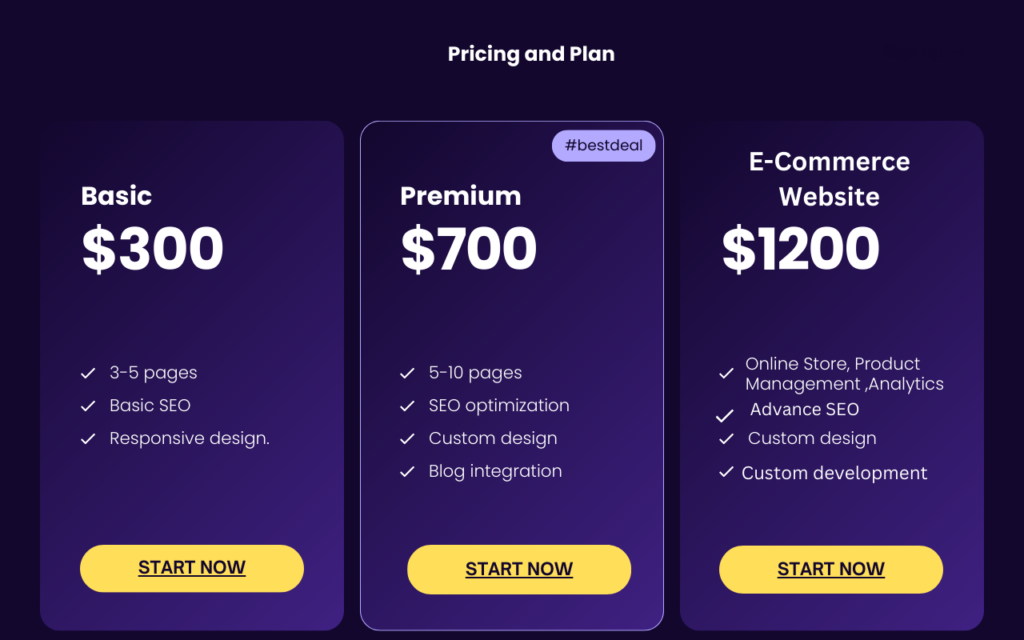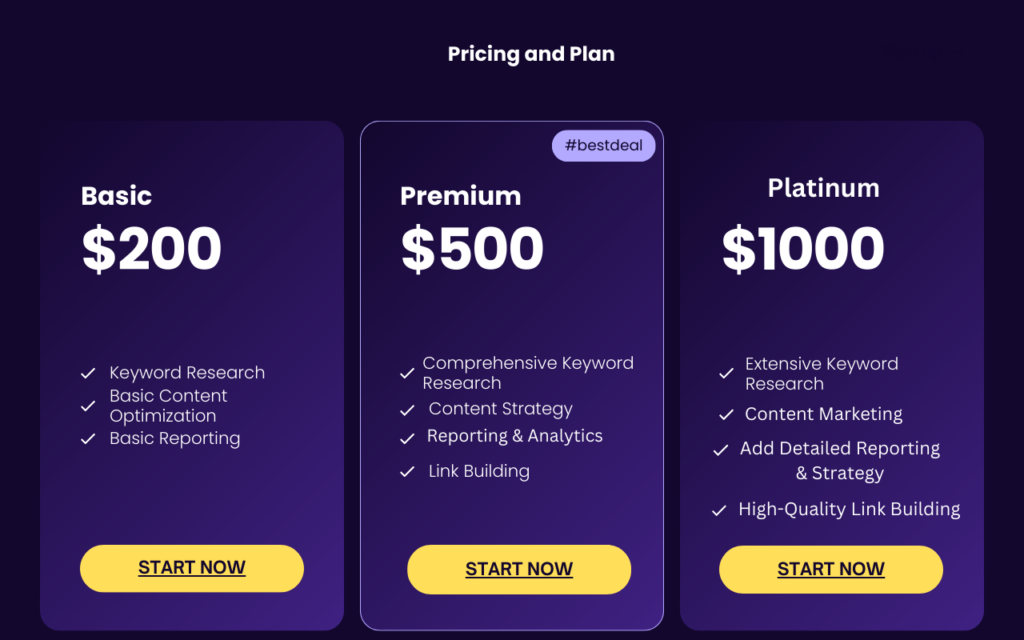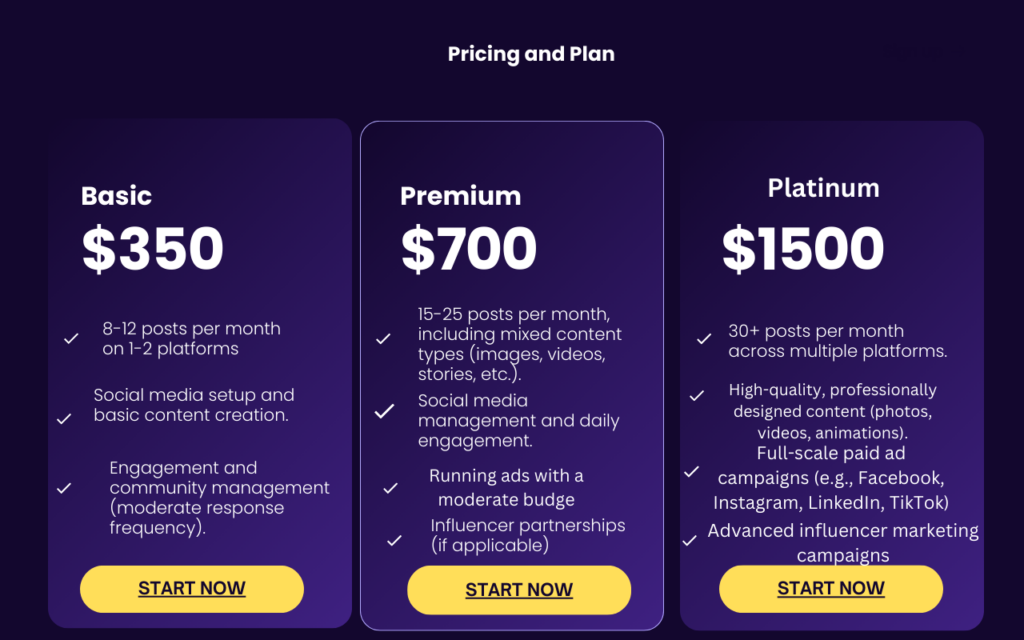Price
Our Website Packages

The pricing depends largely on the size of the business, the complexity of the website, and the level of digital marketing required. It’s best to get a customized quote based on your specific needs and objectives.
Our SEO Packages

Social Media Marketing Plan


Digital Marketing Plan: Your Roadmap to Online Success
In today’s digital world, a solid digital marketing plan is essential to ensure your business stands out, drives targeted traffic, and generates consistent results. Whether you’re looking to improve your brand’s visibility, engage more customers, or increase conversions, a tailored plan is key to achieving your goals.
What is a Digital Marketing Plan?
A digital marketing plan is a strategic roadmap that outlines your goals, tactics, and key performance indicators (KPIs) for reaching and engaging your target audience online. It involves the right mix of online marketing techniques to grow your business through digital channels such as websites, social media, search engines, email, and more.
Why You Need a Digital Marketing Plan
Without a clear strategy, your efforts can be disjointed, resulting in wasted time, money, and missed opportunities. A well-defined digital marketing plan ensures your efforts are aligned with business objectives, making it easier to track progress and adjust strategies as needed. Here’s why you need a plan:
- Consistency: A plan ensures you maintain a consistent voice and presence across all channels.
- Targeted Approach: Focus on strategies that directly address your audience’s needs and pain points.
- Measurable Results: Track your success with clear KPIs, allowing you to refine and improve campaigns.
Key Components of a Digital Marketing Plan
Goal Setting and Objectives
- The first step in creating a digital marketing plan is defining clear, measurable goals. This could include goals like:
- Increasing website traffic by X% in six months.
- Generating X number of leads per month through social media ads.
- Growing social media followers by X% over a set period.
These objectives must be SMART (Specific, Measurable, Achievable, Relevant, Time-bound).
- The first step in creating a digital marketing plan is defining clear, measurable goals. This could include goals like:
Market and Audience Research
- Understand Your Target Audience: This includes demographic data, interests, behaviors, and preferences. The better you know your audience, the more effectively you can tailor your marketing messages.
- Competitor Analysis: Identify key competitors and analyze their digital presence. Understanding their strengths and weaknesses helps you capitalize on gaps in the market.
Digital Channels Selection
- Based on your goals and target audience, you will choose the right mix of digital channels:
- Website/SEO: Ensure your website is optimized for search engines, providing users with valuable content.
- Social Media: Platforms like Facebook, Instagram, LinkedIn, and TikTok offer opportunities to connect and engage with your audience.
- Email Marketing: Keep your leads and customers informed with personalized emails.
- Pay-Per-Click (PPC): Google Ads, social media ads, or display ads help drive traffic quickly.
- Content Marketing: Use blogs, videos, infographics, and other formats to educate and engage your audience.
- Based on your goals and target audience, you will choose the right mix of digital channels:
Content Strategy
- Content is king in digital marketing. Develop a strategy for creating engaging content that aligns with your audience’s needs. This could include:
- Blog Posts: Educate your audience on industry trends and best practices.
- Videos: Share product demos, customer stories, and tutorials.
- Infographics: Share data or complex information in a visually appealing way.
- E-books and Whitepapers: Position your brand as an authority in your industry by providing in-depth insights.
- Content is king in digital marketing. Develop a strategy for creating engaging content that aligns with your audience’s needs. This could include:
Budget Allocation
- Your budget will determine which strategies you can implement and how extensively. Allocate resources effectively across:
- Paid ads (PPC, social media ads)
- Content creation (blogs, videos, etc.)
- Tools and software (SEO tools, email marketing software, social media management tools)
- Your budget will determine which strategies you can implement and how extensively. Allocate resources effectively across:
Implementation Plan
- Develop a timeline and action plan for each digital marketing strategy. This should include:
- Task Assignments: Who is responsible for what?
- Timeline: Deadlines for content creation, ad campaigns, and more.
- Execution: Start running campaigns, posting content, and tracking results.
- Develop a timeline and action plan for each digital marketing strategy. This should include:
Analytics and Performance Tracking
- Regularly monitor your efforts and adjust strategies as needed based on performance data. Use tools like Google Analytics, Facebook Insights, and email tracking tools to measure:
- Website traffic
- Conversion rates
- Social media engagement (likes, shares, comments)
- ROI on paid ads
- Email open and click-through rates
- Regularly monitor your efforts and adjust strategies as needed based on performance data. Use tools like Google Analytics, Facebook Insights, and email tracking tools to measure:
Benefits of a Digital Marketing Plan
- Clear Direction: With a plan in place, every effort is aligned with your business objectives, ensuring a coherent and focused approach.
- Better Resource Allocation: Identify the most effective channels and methods, so you can allocate your resources more effectively and avoid wastage.
- Improved ROI: When your marketing efforts are optimized and targeted, you get better returns on your investments.
- Adaptability: With regular monitoring and adjustments, your plan can evolve with changing trends and audience behaviors.
Example of a Digital Marketing Plan for a Business
Let’s say you own an online clothing store. Your digital marketing plan could include:
- Goal: Increase online sales by 20% in the next 6 months.
- Target Audience: Women aged 25-45, fashion-forward, with disposable income.
- Digital Channels: Instagram (to showcase new arrivals and run ads), Facebook (for ads and engagement), and Google Ads (to drive traffic to product pages).
- Content: 3 Instagram posts per week, Facebook ads running 24/7, and a blog post every week highlighting fashion trends.
- PPC Budget: $1,000/month on Facebook and Google Ads.
Conclusion
A well-thought-out digital marketing plan is essential for driving business success in the online world. It helps you stay focused, make data-driven decisions, and adapt to the ever-evolving digital landscape. Whether you are starting from scratch or optimizing your current strategies, having a clear plan in place ensures that your digital marketing efforts are aligned with your business goals, delivering measurable results.
